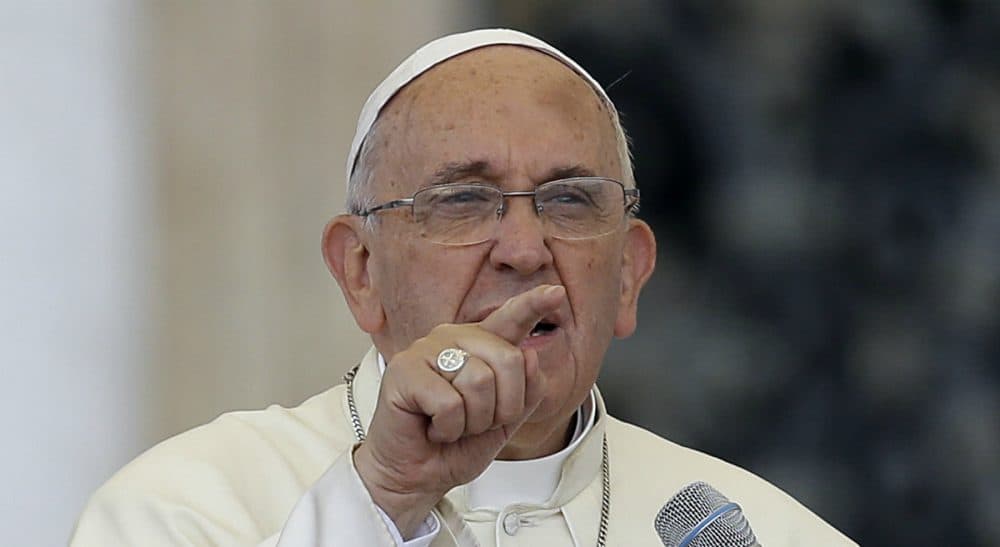Advertisement
Pope Francis On The Immorality Of Environmental Degradation

On Thursday, the Vatican will release Laudato Sii, or Be Praised, a widely anticipated papal encyclical on environmental justice and the toll of environmental degradation on the world’s poorest people. Even before a draft was leaked to an Italian magazine on Monday, The Guardian newspaper called the document “explosive” and “the most anticipated papal letter for decades.” The New York Times reported that the teaching letter, as encyclicals are known, “is being treated as a milestone that could place the Roman Catholic Church at the forefront of a new coalition of religion and science.
Good. I hope it does.
...the church has a great deal to offer a secular world struggling with injustice, inequality and environmental degradation.
Catholicism has important things to say about the role of poverty in society, the role of the economy as it relates to the poor and the role of our species in conjunction with the earth. Despite an historical reputation for clashing with science and a short-term loss of the moral high-ground in the wake of the sex abuse crisis, the framework of social ethics outlined by the church has a great deal to offer a secular world struggling with injustice, inequality and environmental degradation.
We are living in a world without a sufficient common framework for addressing the challenges of poverty, most specifically how it is constructed, the severity of its impact, and the moral obligations of those building it. With regard to this, Pope Francis has been particularly strong, condemning “unbridled consumerism,” and noting, in a 2013 speech to the 38th Conference of the Food and Agriculture Organization of the United Nations:
A way has to be found to enable everyone to benefit from the fruits of the earth, and not simply to close the gap between the affluent and those who must be satisfied with the crumbs falling from the table, but above all to satisfy the demands of justice, fairness and respect for every human being. This is why I want a Church which is poor and for the poor.
This quote offers a glimpse of a framework that is Catholic in its origins but universal in its potential. At its core is a belief that humans, by their very essence, have dignity and, thus, deserve and command fairness and respect. Along with that is the principle of solidarity, or the belief that we are fundamentally connected, and, therefore, as obligated to the well-being of others as we are to our own.
Add to these fundamental ideals the simple principle of sharing, the idea that all, not just some, deserve to enjoy the fruits and benefits of the earth together. There is no room in these beliefs for maximizing individual good to the exclusion of others. Doing so has created a world of inequality. The time has come to right this imbalance.
Which brings us back to Laudato Sii. Poverty compounds and concentrates the impact of climate events, whether droughts, earthquakes, rising sea levels or severe pollution. Those without resources have the least ability to flee or safeguard against the sheer force of environmental blows. They have fewer, if any, financial and material resources to recover after the fact.
Further, environmental preservation is a nicety when survival is on the line. If you’re cold and you don’t have wood to keep you warm, you’ll burn a tire. Air quality is too high up the hierarchy of needs to merit much consideration. There’s a saying in business: “Culture eats strategy for lunch.” Well, poverty eats environmentalism at all three meals, and environmental disasters eat the poor, blessed though they be.
'While we debate the science of temperatures and ice caps, let us practice solidarity in our solutions and give preference to those who bear the brunt of our environmental sins today.
If reports based on the leaked draft are any indication, Laudato Sii will feed weeks of political discussion about everything from global warming and extractive mining to third world economic development. That’s why it is important to draw attention now to themes of the environment as they relate specifically to the poor and marginalized. While we debate the science of temperatures and ice caps, let us practice solidarity in our solutions and give preference to those who bear the brunt of our environmental sins today.
Pope Francis may be the right man at the right time to bring inherently religious values about poverty, the economy and the environment to a broader community.
If so, good. Buy the world a copy and let’s start reading.
